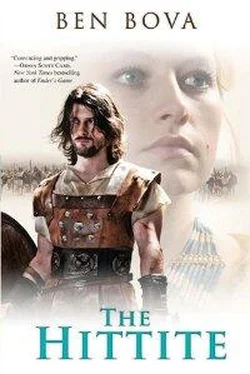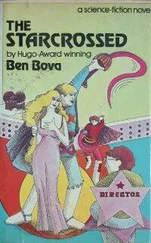A huge shout went up as the last chariot passed through the gate and down the heavily trodden rampway that crossed the trench. The four horses pulling it were magnificent matched blacks, glossy and sleek. The warrior standing in it seemed stockier than most of the others, his armor filigreed with gold inlays.
“That’s the High King!” said Poletes over the roar of the shouting men. “That’s Agamemnon.”
“Is Achilles with them?” I asked.
“No. But that giant over on the left is Great Ajax,” he pointed, excited despite himself. “There’s Odysseos, and—”
An echoing roar reached us from the battlements of Troy. A cloud of dust showed that a contingent of chariots was filing out of the large gate on the right side of the city’s wall and winding its way down the incline that led to the plain before us.
Foot soldiers were hurrying out of our makeshift gate now, menatarms bearing bows, slings, axes, cudgels. Down the ramp of packed sand they hurried and spread out behind the line of Achaian chariots. A few of them wore armor or chain mail, but most of them had nothing more protective than leather vests, some studded with bronze pieces. Squinting into the bright sunshine, I saw that Trojan footmen were lining up behind their chariots. None of the troops marched in order, on either side; they simply ambled out like a horde of undisciplined rabble.
The two armies assembled themselves facing each other on the windswept plain. It grew strangely quiet. The clouds of dust the chariots had raised eddied away on the breeze coming from the sea. The river we had forded the day before formed a natural boundary to the battlefield on our right, while a smaller meandering stream defined the left flank. Beyond their far banks the ground on both sides was green with tussocks of long-bladed grass, but the battlefield itself had been worn bare by chariot wheels and the tramping of horses and warriors.
For nearly the time it took to eat a meal, nothing much happened. The armies stood facing each other. The sun climbed higher in the nearly cloudless sky. Horses whinnied nervously. Heralds went out from each side and spoke with each other while the wind gusted in our ears.
“None of the heroes are challenging each other to single combat this day,” explained Poletes. “The heralds are exchanging offers of peace, which each side will disdainfully refuse.”
“They do this every day?”
He nodded. “Unless it rains.”
A question popped into my mind. “Why are they fighting? What’s the reason for this war?”
Poletes turned his wizened face to me. “Ah, Hittite, that is a good question. They say they are fighting over Helen, the wife of Menalaos, and it’s true that Prince Paris abducted her from Sparta while her husband’s back was turned. Whether she came with him willingly or not, only the gods know.”
“Who is Prince Paris?”
“King Priam’s youn gest son. Sometimes he is called Alexandros.” Poletes broke into a chuckle. “A few days ago Menalaos, the lawful husband of Helen, challenged him to single combat, but Paris ran away. He hid behind his foot soldiers! Can you believe that?”
I didn’t know what to say, so I remained silent.
“Menalaos is King of Sparta and Agamemnon’s brother,” Poletes went on, his voice dropping lower, as if he did not want the others to overhear. “The High King would love to smash Troy flat. That would give him clear sailing through the Dardanelles into the Sea of Black Waters.”
“Is that important?”
“Gold, my boy,” Poletes whispered. “Not merely the yellow metal that kings adorn themselves with, but the golden grain that grows by the far shores of that sea. A land awash in grain. But no one can pass through the straits and get at it unless they pay a tribute to Troy.”
I was beginning to understand the reason behind this war.
“Paris was on a mission of peace to Mycenae, to arrange a new trade agreement between his father, Priam, and High King Agamemnon. He stopped off at Sparta and ended up abducting the beautiful Helen instead. That was all the excuse Agamemnon needed. If he can conquer Troy he can have free access to the riches of the lands beyond the Dardanelles.”
“Why don’t the Trojans simply return Helen to her rightful husband? That would put an end to this war, wouldn’t it?”
Poletes smiled knowingly. “It would indeed. But you have not seen the golden-haired Helen.”
“Have you?”
He shook his head sadly. “No. But everyone who has agrees that she is the most beautiful woman in the world. Aphrodite’s child, they claim.”
“No woman could be so important that men would fight a war over her.” But I remembered that the night before I was almost willing to attack Agamemnon’s lodge to seize my wife and sons. Almost.
“Perhaps so, Hittite,” said Poletes. “Helen is merely an excuse for Agamemnon’s greed. But the Trojans won’t give her up and here we are.”
A series of bugle blasts erupted on the plain before us.
“Now it begins,” Poletes said, suddenly grim, hard-eyed. “Now the fools rush to the slaughter once again.”
Standing beside Poletes atop the rampart I watched as the charioteers cracked their whips and the horses bolted forward, carrying Achaians and Trojans eagerly toward each other.
I focused my attention on the chariot nearest us and saw the warrior in it setting his sandaled feet in a pair of raised sockets, to give him a firm base for using his spears. He held his body-length shield before him on his left arm and with his free hand plucked one of the lighter, shorter spears from the handful rattling in their holder.
“Diomedes,” said Poletes, before I asked. “Prince of Argos. A fine young man.”
Shrieks and screams filled the air as each warrior shouted out his battle cry. The horses pounded madly across the field, eyes bulging, nostrils wide.
The chariot approaching Diomedes swerved suddenly and the warrior in it hurled his spear. It sailed harmlessly past the prince of Argos. Diomedes threw his spear and hit the rump of the farthest of his opponent’s four horses. The horse whickered and reared, throwing the other three so far off stride that the chariot slewed wildly, tumbling the warrior onto the dusty ground. The charioteer ducked behind the chariot’s siding.
Other combats were turning the worn-bare battlefield into a vast cloud of dust, with chariots wheeling, spears hurtling through the air, shrill battle cries and shouted curses ringing everywhere. The foot soldiers seemed to be holding back, letting the noblemen fight their single encounters for the first few moments of the battle.
I could see no order to the battle, no judgment or tactics. The nobles in their chariots merely rushed into single combat against the enemy’s chariot-riding noblemen. No formations of chariots, no organized plan of attack, nothing but chaos.
One voice pierced all the others, a weird screaming cry like a seagull gone mad with frenzy.
“The battle cry of Odysseos,” Poletes said. “You can always hear the King of Ithaca above all the others.”
I was still concentrating on Diomedes, eager to learn how these Achaians fought their battles. As his opponent sprawled in the dust, his charioteer reined in his team and Diomedes hopped down to the ground, two spears gripped in his left hand, his massive figure-eight shield bumping against his helmet and greaves.
“A lesser man would have speared his foe from the chariot,” said Poletes admiringly. “Diomedes is a true nobleman. Would that he had been in Argos when Clytemnestra’s men put me out!”
Diomedes approached the fallen warrior, who clambered back to his feet and held his shield before him while drawing his long sword from its sheath. The prince of Argos took his longest and heaviest spear in his right hand and shook it menacingly. I could not hear what the two men were saying to each other, but they shouted something back and forth.
Читать дальше












